Dr. Vaughan sheds light on her own COVID-19 vaccine experience and as well as safety, pregnancy and fertility considerations for her patients.
This blog post was updated on March 25, 2021.
This past year has been filled with a multitude of challenges caused by the emergence of the deadly and infectious coronavirus disease 2019 (SARS-CoV-2). To date, over 23 million Americans have been diagnosed with the disease, and over 400,000 have lost their lives to this infectious new strain of coronavirus.
The amazing news to come out of these challenging times is the rapid and unprecedented development of vaccines in 2020. Public and private researchers accomplished in 10 months what normally takes 8 years to produce. Two vaccines are currently available for public use. They are conditionally approved by the FDA and were found to be more than 90% effective at protecting people from infection with COVID-19.
I was fortunate enough to be one of the frontline workers offered the long-awaited COVID-19 vaccine in December, and I received my second dose of the Pfizer vaccine a week before writing this article in mid-January. Below are some thoughts about my experience.
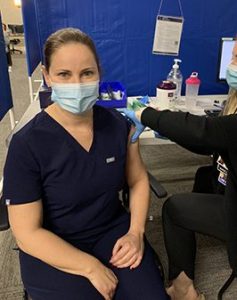
Was I nervous?
Yes, however, I read as much as I could about the vaccine from scientific and medical literature and felt really good about my decision to be vaccinated.
Did I regret my decision?
Absolutely not!
So why did I get the vaccine?
After doing my research of the medical and scientific literature, getting the vaccine was a lot less risky than catching the actual COVID-19 disease. I have never had any severe allergic reactions to vaccines in the past, and I don’t want to be the reason someone dies from COVID-19. I did it not only for myself, but for my patients, my family, my friends, and my colleagues.
What side effects did I experience?
After the first dose of the Pfizer vaccine that I received in December, my only side effects were a sore arm for 24 hours and a mild headache that was easily treated with ibuprofen.
After the second dose in January, my sore arm was back, but I also experienced some mild flu-like symptoms (muscle aches, chills, and fatigue) for about 48 hours. I still was able to work and I alternated ibuprofen and Tylenol to control the symptoms. I wasn’t upset about experiencing side effects because that was a great sign that my body was reacting to the vaccine – and that reaction is what produces the antibodies that will protect me from getting sick if I am exposed to COVID-19 in the future!
Do I recommend that my pregnant patients get the vaccine?
I do. The mRNA vaccines are NOT live virus vaccines. They do not enter the cell nucleus and do not alter human DNA in vaccine recipients. As a result, the mRNA vaccines can’t cause any genetic changes. In fact, in the studies for the currently approved vaccines, pregnant patients were vaccinated inadvertently, and they and their babies have all done well.
Additionally, our pregnant patients are a high-risk group. Available data suggests that symptomatic pregnant patients with COVID-19 are at increased risk of more severe illness compared with non-pregnant patients.
The two vaccines currently available have not yet been tested in pregnant women; therefore, I support my patients’ decision either way and try to reinforce social distancing, mask wearing, and frequent handwashing.
*Update as of March 25, 2021: The COVID-19 mRNA vaccines (Pfizer and Moderna) are just as effective in pregnant and lactating women as women who are not pregnant, according to a study published in the American Journal of Obstetrics and Gynecology. Vaccine-induced antibody levels were “strikingly higher” than those resulting from coronavirus infection during pregnancy. The study also showed that women passed protective antibodies to their newborns via the placenta and breastmilk.”
Does COVID-19 vaccination cause female sterilization?
No. There is no data or information that the vaccine affects fertility. Those claiming a link between the spike protein formed by receiving the mRNA-based vaccines and blockage of a protein necessary for formation of the human placenta and its adherence to the uterus are false and untrue.
Do I need to continue to wear a mask and socially distance after receiving the vaccine series?
Yes. We do not yet know if you can still transmit the virus to others after receiving the vaccine series. Therefore, until most of the US population is vaccinated, we will still need to practice these safety measures. However, the end is in sight!
I am so happy to have received the vaccine series and hope this will help our patients make the right choice for themselves!
What are other VPFW providers saying?
We asked a few of my colleagues about there experience with the vaccine, from symptoms to how they feel about it in general. Here’s what they said.
Dr. Mark Hyde: I had a sore arm for 24 hours both times, and that was all! So happy to have been vaccinated to keep my patients and family safe.
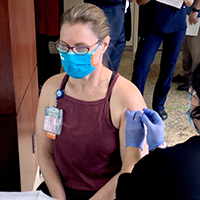
Dr. Emily Stone: After both doses I had in-arm soreness for 24 hours and no other symptoms. It was easy and painless. I wore my “do good” mask to get vaccinated! Doing good for our community, my family, our hospital, our patients, and myself.
Dr. Nina Olsen: I just got my first dose this morning at 7am (Jan. 14th). No symptoms so far! I am 24 weeks pregnant, so this was a difficult decision as this vaccine has not been studied in pregnant patients, but I felt like this was the right decision for my family and my community. I encourage everyone to get vaccinated whenever they get a chance, so we can beat this virus and finally go back to normal life!
Dr. Jennie Draper: I was tired for the day following second dose and had no other symptoms. I’m grateful we have a vaccine available and can’t wait for more people to have access to it!
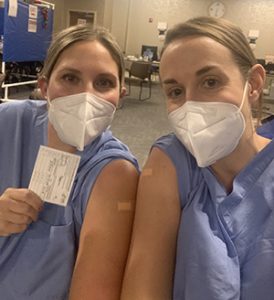
Dr. Amy Hempel: I had a mild headache after the first dose and then had some muscle aches and chills after second, but ultimately it was not too bad. They only lasted a few hours. Getting the vaccine was a privilege and an easy process once scheduled. I highly recommend people get it once available!
Dr. Padmini Santosh: I experienced some fatigue and discomfort at the injection site the day after its administration. I took some Aleve and felt fine. It did not stop me from doing any of my chores or activities. All in all it was a good experience, and I’m very happy that I was able to receive the vaccine.
Lauren Cook, N.P.: Just about everything we do in our daily practices is a direct result of science—well-studied, evidence-based science—and the COVID-19 vaccine is no different. It is invigorating to be a part of such a big event in history and in science.
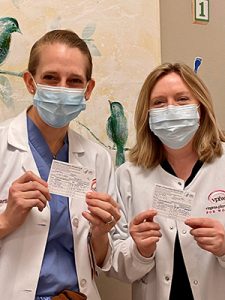
Dr. Cara Hartle: After my first COVID-19 vaccine dose I had only mild arm soreness, otherwise I felt great! After my second dose I had even more mild arm soreness and some axillary lymph node tenderness for 2 days. Otherwise I had no other symptoms! My mild symptoms only lasted about 2 days.
I couldn’t have been more happy and excited to receive my COVID 19 vaccine. Science is truly an amazing thing and I am proud to be part of history in ending this pandemic. I am also so proud of my nurse, Jeanette, for also jumping at her first chance to get the vaccine. Now we can feel protected while continuing to do our work and know that we are protecting ourselves, our families, our patients, and our community.
Dr. Mary Lynn Coble: As expected, I had a sore arm and felt kind of tired and achy for 36-48 hours. Not very bothersome, and this is a normal response after a vaccine. I was just very thankful to have received it! I encourage everyone to receive the vaccine when it is offered to them.
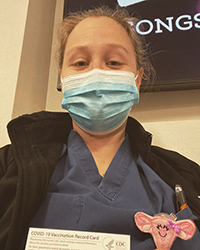
Dr. Natalie Dogal: I had mild arm soreness with my first dose and then had muscle aches and a headache with my second dose (which all went away within 24 hours). I am very grateful for science and for everyone who worked so hard to get this vaccine created and produced.
Dr. Allison Giles: After my first dose of the Pfizer vaccine, my arm was pretty sore for the next 2 days. I took some ibuprofen, and it helped a lot. About 12 hours after my second dose, my arm started to hurt again, I had a headache and some body aches. I took ibuprofen every 6 hours for 3 doses and all my symptoms were gone after 36 hours. I do not have any underlying medical conditions – unless you count a very low pain tolerance. I was, therefore, pretty nervous about the shot and its side effects. Even I managed not to complain (very much).
I feel so lucky to already be fully vaccinated. Living for almost a year with the fear of getting COVID-19 and possibly bringing it back to my family was exhausting. Now that anxiety has been greatly alleviated, if not completely eliminated. I am happy to speak with anyone who has concerns or questions regarding the vaccine.
*We currently do not offer the COVID-19 vaccine at VPFW. Check the Virginia Health Department website for information on eligibility and availability.*
To schedule an appointment with a VPFW provider, you can call us at 804-897-2100 or set an appointment online.
